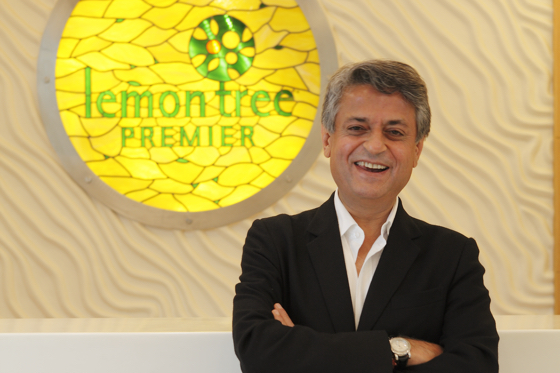Patu Keswani, chairman and managing director of Lemon Tree Hotels in India, is reinventing the mid-market sector in his homeland, but more than that, he is championing “losers of the ovarian lottery.”
His work in shifting the mindset to bring less fortunate people into Lemon Tree’s workforce makes mothers cry out of gratefulness. Fresh from a Lemon Tree IPO in March, Keswani shows his targets aren’t just more dollars but more heart, vowing that by 2021, “I want 40% of our employees to be opportunity-deprived Indians,” he told HOTELS in a recent interview.
That means at least 5,000 staff, as he expects Lemon Tree Hotels will grow to 12,000 rooms by then. The chain currently has 5,000 rooms and of its 5,500 staff, around 1,000 are opportunity-deprived Indians, he said.
Opportunity-deprived Indians comprise those with physical disabilities, including speech and hearing impaired, orthopedically handicapped, acid survivors and, going forward, visually impaired and low vision.

Lemon Tree has also added two other groups – people with intellectual disability from Down Syndrome and autism, and those who are marginalized or from economically or socially weak segments. Those include people below the poverty line, widowed or battered women, orphans or abandoned girls, and those from communities that have limited education and employment opportunities.
Keswani also wants to see them become general managers – at least two by 2021. Some have already become managers, he said. And he makes it mandatory for any person who wants to be promoted to manager at Lemon Tree to learn Indian sign language and get an 85% score in a compulsory exam. “We have about 2,000 people who speak Indian sign language at Lemon Tree,” he said proudly.
The initiative started in 2007 when Keswani told his HR manager to hire two deaf people. “I didn’t even know they were called speech and hearing impaired,” he recalled. “At the time we had six hotels. Three months passed, then one day the mother of one of the two boys, he was in his early 20s, came to me with a bouquet of flowers and tears in her eyes. She thanked me as her son was getting married. By giving him an entry-level job, we made him capable of getting married. It was enormously inspiring.”
Along the way, Lemon Tree began hiring individuals with many other disabilities and taking in uneducated people who could not get jobs. “It was a smart business decision, as it was a talent pool nobody accessed,” Keswani said. “We had only to re-orient our job roles such that we could make the disability irrelevant, and re-orient our training and development. Also, make a small shift in the mindset – an education-illiterate person does not mean he is functionally illiterate.”
Keswani wants to make clear that there is no charity involved here. “They must be able to do a full day’s job, because one of the big roadblocks was overcoming internal concerns among staff that these employees would not be able to contribute their fair share,” he added.
Keswani, who chairs the Indian government’s Skill Council for Persons with Disability, said the council is looking to evangelize such initiatives to other companies in India.
“I was reading a question to Warren Buffett on what makes him the world’s most successful investor. With great humility, he replied, he was a winner of the ovarian lottery – born to the right parents at the right place and right time,” Keswani said. “I realized in India there are many people who are losers of the ovarian lottery. It’s not that they have wrong parents, it’s wrong circumstances.”
